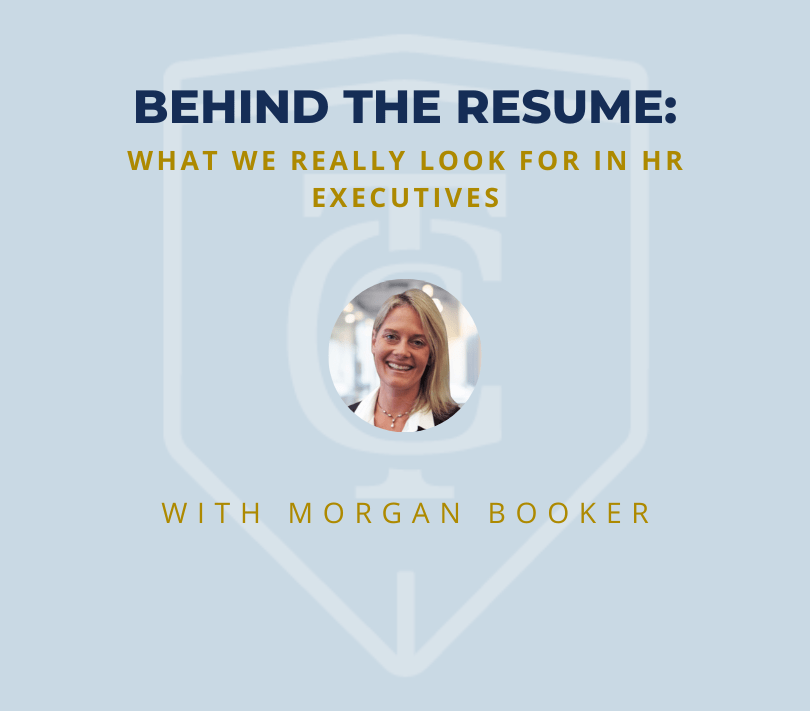
A polished resume? It’s a solid start. But when it comes to evaluating executive HR talent, it’s just the surface. As Executive HR Recruiters, we talk to dozens (okay, hundreds) of senior HR leaders every year. And the ones who stand out? It’s not because they have the longest list of certifications or the most Fortune 500 logos on their LinkedIn. What really stands out, and what hiring teams care most about in 2025, is the substance underneath. The impact, the leadership story, the strategy behind the buzzwords.
Here’s what actually catches our attention:
Narrative Clarity: We want to see more than a job description. We want to understand what changed because you were there. The strongest candidates can clearly walk you through what they did, why they did it, and how it moved the business forward. Strong candidates connect the dots between their actions and the outcomes.
- “Redesigned global performance management process, increasing manager participation from 45% to 92% in one year.”
- “Introduced employee listening tools and translated findings into a quarterly action plan that reduced regrettable attrition by 18%.”
That tells a clear story: scope, action, and measurable results, all in one line.
Courage and Change Leadership: Great HR leaders don’t just manage, they challenge. They speak up when something’s broken. They lead unpopular but necessary transformations. Maybe they entered a highly regulated environment and shifted HR from compliance-only to a true strategic function. Or they turned around a disengaged workforce with brutal honesty and big-picture thinking. It’s not about keeping the ship steady, it’s about knowing when to turn the wheel. Change takes guts.
- “Led post-acquisition HR integration across five legacy systems, reducing administrative workload by 40% and unifying org-wide processes within 9 months.”
- “Navigated a high-turnover environment by rebuilding leadership trust through transparent communication and manager re-training, decreasing voluntary attrition by 35% in under a year.”
We see it all the time: the strongest candidates don’t gloss over the hard stuff, they highlight how they navigated it and what they accomplished.
Business Fluency: Great HR leaders speak the language of the business. They connect what they do to revenue, efficiency, growth, and risk mitigation. They know their metrics. We’re talking time-to-fill, DEI progression, revenue per employee, and how those link to business outcomes. Someone who can explain how a reskilled talent pipeline supported a new product launch or directly boosted productivity? That’s someone you want influencing strategy at the highest levels.
- “Aligned compensation strategy with corporate financial goals, improving comp-to-revenue ratio by 9% while increasing retention in key roles.”
- “Partnered with Sales and Ops to build a predictive hiring model, cutting time-to-fill for revenue-generating roles by 35 days.”
This isn’t just HR work, it’s business leadership through an HR lens.
Organizational Context Matters: Something else that gets overlooked? Company details. When a candidate lists an organization, we want more than just the name, we need context What industry is it in? Is it public, private, PE-backed? How many people did you support, and how big was your team? What was the scale of your impact?
- “SVP of HR, global specialty chemicals manufacturer (public, $2.4B revenue, 4,500 employees, 6 direct reports).”
That kind of context gives weight to the accomplishments that follow. It helps the reader understand where you were making an impact and how transferable your experience might be.
Humanity and Culture Impact: Let’s not forget, the best leaders still make people feel seen. In today’s world of AI and dashboards, the ability to build trust, show humility, and connect across every level of the org is a competitive edge. The HR exec who can build an award-winning culture and lighten the mood in a board meeting? That’s a unicorn.
- “Launched inclusive leadership training for 400+ managers; 97% reported increased confidence managing diverse teams.”
- “Piloted caregiver benefits program that led to a 22% increase in internal mobility among working parents.”
These wins reflect empathy, listening, and the real-world impact HR can have on people’s lives.
A resume may open the door. But it’s the story: your leadership voice, strategic thinking, and ability to move an organization forward that makes you unforgettable. If you’re writing or refreshing your resume this year, don’t just list what you’ve done. Frame it through the lens of impact. Make it read like the executive summary of someone ready for the next big chapter.
And if you’re hiring your next HR executive? Don’t stop at the title. Dig into the “where,” the “how,” and the “so what.” That’s where the leadership really lives.
About Morgan Booker
 Morgan has over 18 years of Talent Acquisition, Employee Relations, and Human Resource Business Partner experience. She joined The Christopher Group in 2022 as a Recruiting Manager and has since been promoted to Recruiting Director. Morgan’s focus is partnering with executive Human Resources candidates across the United States to fill Human Resources executive roles. To learn more about Morgan visit her bio page.
Morgan has over 18 years of Talent Acquisition, Employee Relations, and Human Resource Business Partner experience. She joined The Christopher Group in 2022 as a Recruiting Manager and has since been promoted to Recruiting Director. Morgan’s focus is partnering with executive Human Resources candidates across the United States to fill Human Resources executive roles. To learn more about Morgan visit her bio page.

